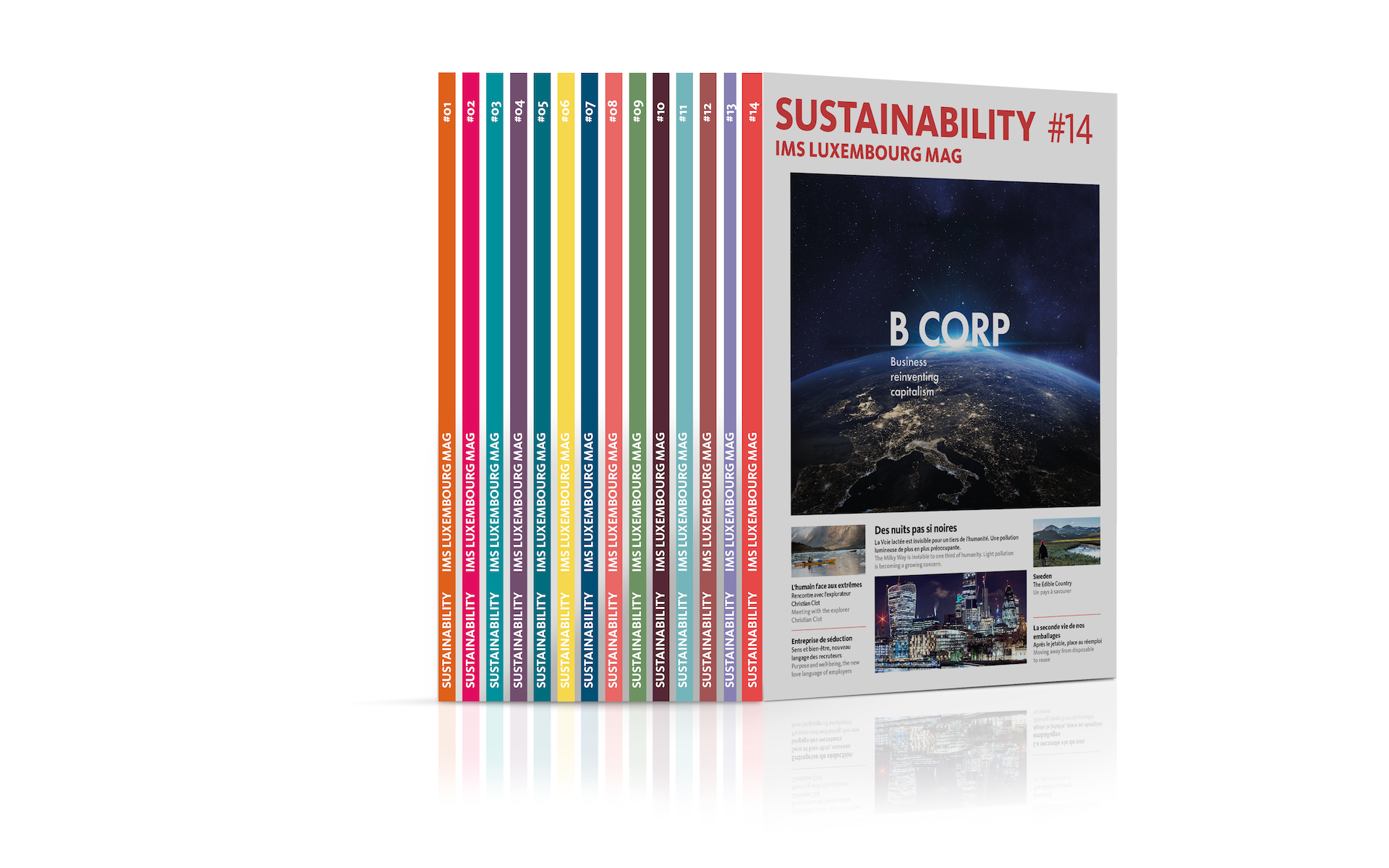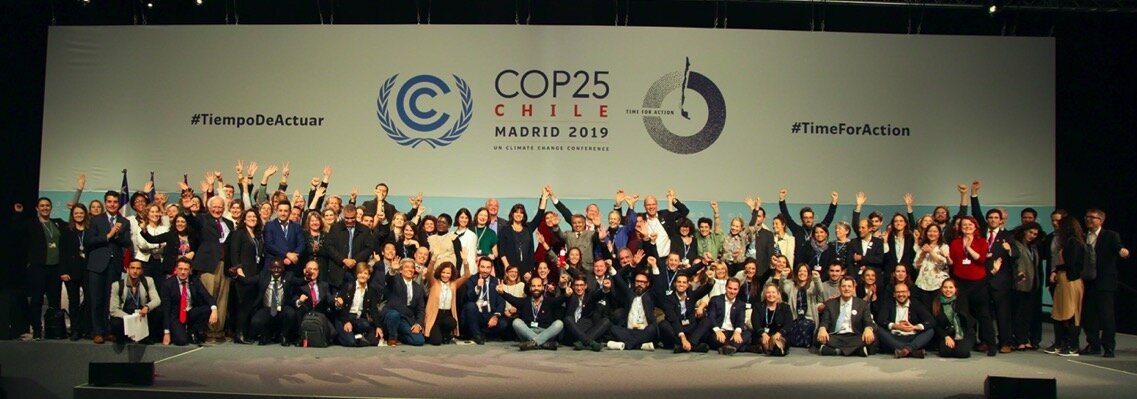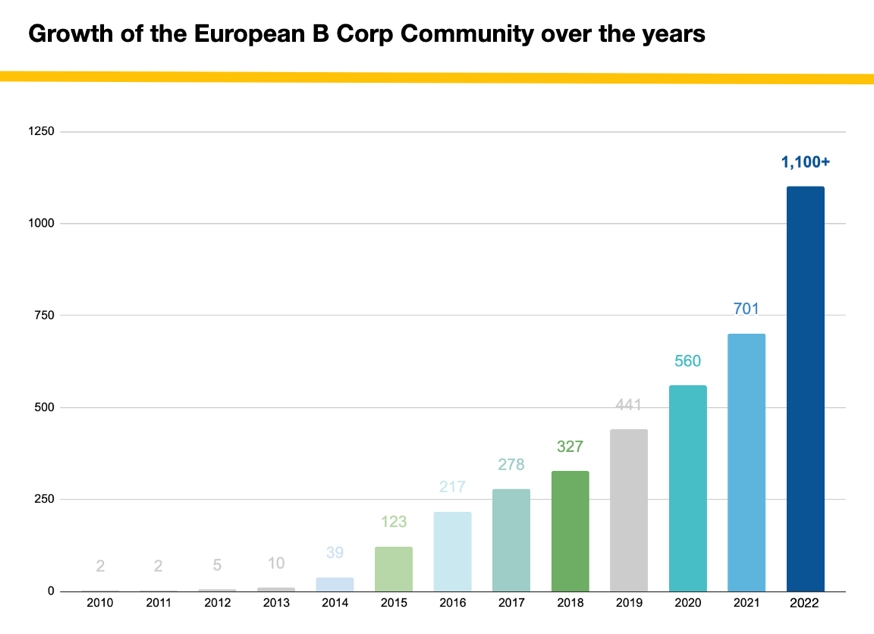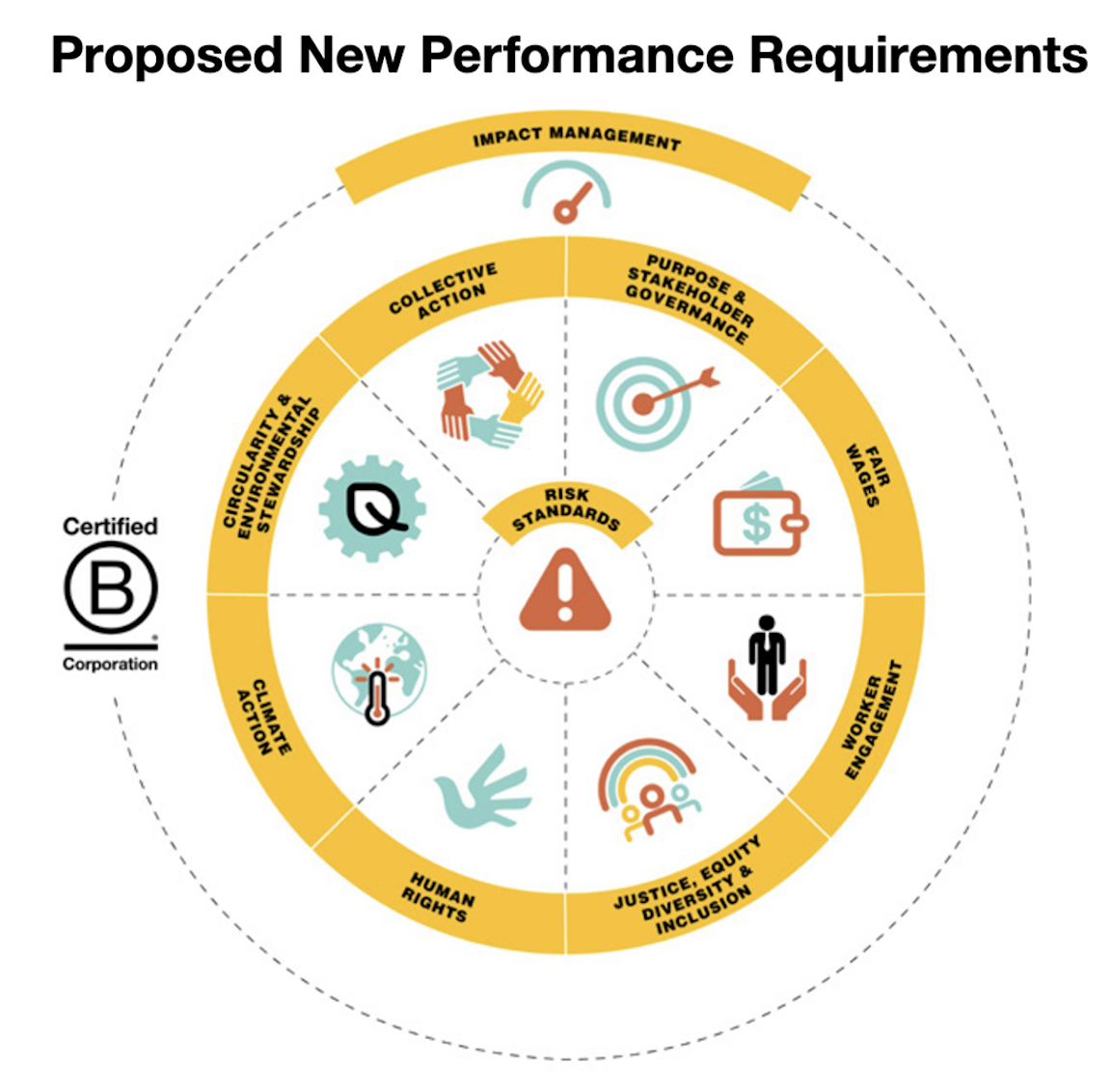More than 6,000 companies representing half a million employees now bear the B Corp logo. In the vast jungle of labels and certifications, this movement, like no other, definitely stands out. Founded on the other side of the Atlantic by three entrepreneurs in 2007, it has experienced a real bloom in recent years with a presence in over 85 countries and 150 industries. Having now topped the 1,000 mark in both Europe and the UK, the certification can proudly count among its ranks companies with a golden reputation such as Patagonia, Too Good to Go, Fairphone, Danone or Pukka teas. After rapid growth in the Netherlands and Belgium, Luxembourg is emerging as a promising land for an inclusive, equitable and regenerative economy that stands at the core of the B Corp vision. So what can one find behind the "Business for Good" promise? Tour of the B.
The base of the "B"
Looking at the B Corp movement and its purpose, several keys to understanding its growth emerge. The first is that our current economic system, driven by business as one of its key actors, is creating significant negative impacts across the entire globe and on all aspects of society. Critical and irreversible climate and ecosystem impacts, overlooked and undermined human rights, overexploited and wasted resources... All elements come together for an ultimate disaster scenario. B Corp believes in a profoundly different narrative; that of a future benefiting all people and the planet, built through a more inclusive, equitable and regenerative economy. A vision some might come to call utopian, unrealistic. Still. Over the years, an ever-growing number of decision-makers are choosing to embark their companies on this movement building it into a strong and militant community.
The second key: movement activation. This one is based on B Corp's "theory of change." The idea? To move from creating value essentially for shareholders with a short-term outlook and in an extractive way to generating value in an inclusive, long-term and regenerative way for all stakeholders. This new approach to corporates’ "raison d'être" requires a redefinition of articles of association that every business aspiring to be certified must embed. Beyond limiting negative externalities, each B Corp commits itself by activating its decisive influence to create positive impact for the common good.
More than that. While B Corp addresses companies' behaviour and their impact on stakeholders, the ambition for change goes beyond. It is about being a catalyst for systemic change. On the one hand, it intends to profoundly influence private sector norms and cultural expectations; to redefine the general perception of the role of business in society. On the other hand, the goal is to play a significant role in shaping the policies and legal frameworks that govern businesses. Over a certification, this is what makes B Corp a movement with high societal ambitions.
Credit: B Lab Spain
Campaign for the recognition of the legal status of "enterprise à mission" in Spain.
The benefits of "B" in action
From words to deeds, many B Corps worldwide are taking action to make the theory of change a reality, both within their companies and at a broader level.
In November 2022, the "Brussels Beer Project" brewery, having initially launched its business with the dream of making consumers and their products travel as far as possible, announced that it would stop all export activities outside of Europe with a new wish: to sell as closely as possible. And the "Brasserie Léopold", also based in Belgium, does not sell any bottles beyond France to limit the carbon footprint of their products.
On a larger scale, earlier this year, Patagonia founder Yvon Chouinard bequeathed his company to Mother Nature with 100% of the company's capital and voting rights passed on to organisations involved in safeguarding the planet. In the meantime, in partnership with Makers Unite, the company opened a "Repair Centre" for all types of garments and other outdoor items in Amsterdam. Their goal: 1,000,000 kilos of avoided textile waste.
In Spain, under the impulse of the research firm Gabeiras y Asociados, Danone and the public relations agency Harmon, the B Corp movement launched a national public campaign for the legal recognition of the status of "entreprise à mission." Two years and 30,000 signatures later, the initiative is a success.
These few examples illustrate the philosophy that brings companies together under the "B"; the ambition to be the best for the world rather than the best in the world. To achieve this, several ingredients must be combined, including creating a ripple effect and community. Many B Corp companies form partnerships, task forces, or coalitions to make this happen. Together they share best practices and questions, they challenge each other and engage on various issues ranging from human resource management to building strong calls for action under a common voice at the COPs.
All these initiatives within the movement federate to build a roadmap with positive outputs for society and allow all new companies joining to take advantage of the work already done to create a snowball effect for a more impactful and faster transition.
Credit: B Lab Spain
On stage at COP25, representatives of B Corp certified companies committed to achieving "Net Zero" by 2030
Momentum and challenges to scale up
From 2020 to 2022, B Corp certified European companies have doubled to reach 1,100 "Businesses for good". These companies decided and managed to commit to a demanding certification process covering all fields of influence. Could this mark the tipping point of a fundamental transition for companies on the old continent?
For some leaders of certified companies, such as Carlo Hein, founder of the Luxembourgish cider company Ramborn, the explanation is clear: "Before Covid, in the last ten years, most companies in Europe had not really experienced any major difficulties, especially in Luxembourg. They didn't really need to question their models. Today, things are different and the pressures are multiple. Companies face a choice: transform to be more sustainable or be destined to perish. The B Corp model responds to the need for change by guiding companies to the right questions and by offering a community of like-minded people ready to challenge and help each other".
The B Corp movement has the wind in its sails. How many B Corps will there be in Europe and Luxembourg in five or ten years? Will the exception become the norm? The scaling-up that seems to be taking place yet bears many challenges. Not the least of which is the credibility of the certification. To keep the bar high and ensure a process of continuous improvement and in tune with current challenges, B Lab, the NGO behind B Corp, initiated an unprecedented review of its certification standards.
But a growing community also means more risk of turbulence. In June 2022, the first B Corp in the Benelux and one of the prestigious members of the world's top 10 B Corps Dopper, producing popular reusable water bottles, launched a campaign against Evian and Spadel that had just joined the movement. The campaign targeted the production of single-use plastics on a global scale and their direct impacts on the environment.
Such sensitive matters stand along the topics under B Lab's radar to ensure that the B Corp vision and community are protected as the movement grows. Many other industries are being reviewed to determine if and under what conditions they are eligible for certification. Among them are pharmaceuticals, fossil fuels, financial markets, for-profit higher education providers, gambling, zoos and animal parks, etc.
On a common basis, for all these sectors, B Lab explains that there is a natural tension between the tendency to exclude these companies and the potential to transform the culture, behavior and impact of these industries. In practical terms, B Lab and its stakeholders publish position statements and adopt, where appropriate, advanced standards and analytical processes to differentiate the "good and bad" actors based on rigorous standards of social and environmental performance, legal accountability and public transparency.
Source: B Lab Europe
As part of the new B Corp standards due to take place in 2024, 10 core themes are currently being highlighted. Specific criteria will need to be met around these
themes to achieve certification. These requirements should eventually replace the current,
and more modular, approach linked to obtaining an 80-point score based on 5 pillars of companies' influence on their stakeholders (workers, customers, environment, community and governance).
On the same topic, many eyebrows have been raised on Nespresso's achievement to become a B Corp. In the face of controversy, B Lab again points to a rigorous process, a transparent approach and the need to recognise that while companies achieving certification meet highly demanding standards, this does not mean they are perfect. The whole point of the process is to continue to improve, transform and meet challenges, including a re-certification process every three years.
As matter of fact, Nespresso has just announced the launch of compostable capsules. Could this be a sign of the movement's driving force? In the end, B Lab reminds us it is essential that large companies and multinationals be included in the process to ensure a real shift to a sustainable economy and society.
B Corp in Luxembourg
- 5 Companies based in Luxembourg are certified B Corp
INNPACT, FARAD GROUP, RAMBORN, A BEAUTIFUL GREEN, GO TO FREEDOM
- 5 Companies are currently in the certification process
- 78 B Corp companies with their headquarters abroad are active in Luxembourg
- >200 More than 200 companies in Luxembourg have already taken the self-assessment offered free of charge by the B Impact Assessment online tool
- 18 B Leaders in the country can support companies that wish to apply for certification
B Corp in Luxembourg
- 5 Companies based in Luxembourg are certified B Corp
INNPACT, FARAD GROUP, RAMBORN, A BEAUTIFUL GREEN, GO TO FREEDOM
- 5 Companies are currently in the certification process
- 78 B Corp companies with their headquarters abroad are active in Luxembourg
- >200 More than 200 companies in Luxembourg have already taken the self-assessment offered free of charge by the B Impact Assessment online tool
- 18 B Leaders in the country can support companies that wish to apply for certification
To be read also in the dossier "B Corp business reinventing capitalism"






